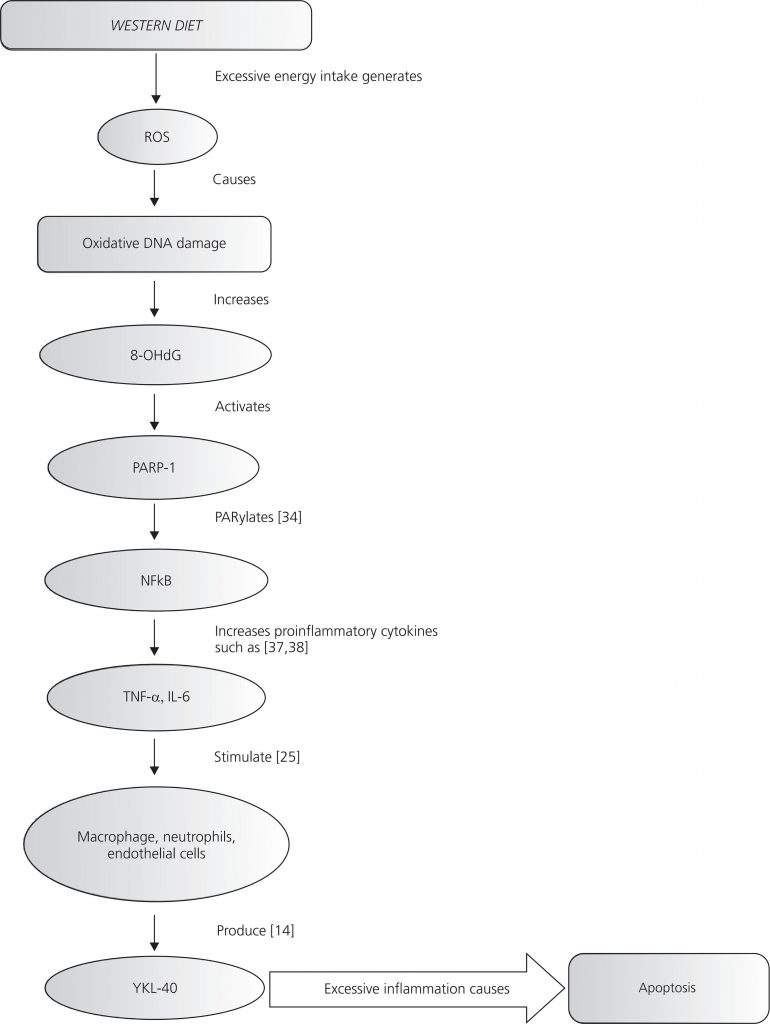By Yeşim Yener, Associated Professor, Faculty of Education, Bolu Abant İzzet Baysal University, Bolu, Turkey and Fatma Hümeyra Yerlikaya, Associated Professor, Faculty of Medicine, Necmettin Erbakan University, Konya, Turkey
Researchers from University of Bolu Abant İzzet Baysal and Necmettin Erbakan in Turkey conducted a study with Wistar rats and found that Western diet produces endogenous oxidative DNA damage and this damage activates PARP-1 molecules that leads to inflammation. The results were published in of Revista de Nutrição, (Vol. 31, No. 3), with the title “Western diet induces endogen oxidative deoxyribonucleic acid damage and inflammation in Wistar rats”. Many people living in developed and developing countries prefer the Western diet, which has both a high fat and sugar content. Because they sustain this dietary lifestyle, they develop nutritional diseases such as metabolic syndrome, cardiovascular disorder or chronic inflammation. In this study, researchers investigated whether the Western diet produced endogenous oxidative DNA damage, apoptosis or inflammation. Thus, they fed 10-12-week-old male and female rats with a high-sugar diet containing 69% sucrose, a high-fat diet containing 35% fat, and a combination of these two diets, for four weeks.
Researchers found no changes in the levels of serum soluble urokinase-type plasminogen activator receptor (suPAR), Fas ligand (Fas L) and cytochrome c (Cyt c), but they found a statistically significant increase in the levels of serum 8-hydroxy-2-deoxyguanosine (8-OHdG), an indicator of endogenous oxidative DNA damage, poly (adenosine diphosphate ribose) polymerase-1 (PARP-1), the enzyme repairing for this damage, and chitinase-3-like protein 1 (YKL-40), an inflammatory marker, in rats fed exclusively on the Western diet. They also found that YKL-40 is a more sensitive inflammatory marker than the other inflammatory marker suPAR.
PARP-1 is an enzyme responsible for repairing 8-OHdG lesions (MARTIN-OLIVA, et al., 2015). Thus, increasing these lesions also increases the activation of PARP-1 under pathophysiological conditions affecting DNA (DING, et al., 2008). In the current study, serum PARP-1 and 8-OHdG levels increased significantly in rats fed on the Western diet. This finding indicates that the Western diet caused oxidative DNA damage, which in turn elevated the PARP-1 molecules to repair this damage. PARP-1 also plays a role in the inflammatory process. In this process, PARP-1 PARylated transcription factors, such as Nuclear Factor kappa B (NFkB), altered their activities (SWİNDALL; STANLEY; YANG 2013) and this alteration caused the release of inflammatory cytokines such as tumor necrosis factor alpha (TNFα) and interleukin-6 (IL-6) (OLIVER, et al., 1999; PATEL, et al., 2007). The release of these cytokines induces the expression of YKL-40 by macrophages (KJAERGAARD, 2016; MUÑOZ; COSTA, 2013).
Our findings showed that excessive energy uptake with the Western diet leads to endogenous DNA damage, triggering the expression of inflammatory genes and, at the same time, increasing the level of PARP-1 molecules to repair the damage. In addition, increased PARP-1 molecules activate proinflammatory cytokines, thereby inducing the release of YKL-40 from macrophages, thus contributing to the inflammatory process (Figure 1). If the inflammation is excessive, it may result in apoptosis. Continued consumption of this diet may trigger the development of a variety of chronic inflammatory diseases.
Figure 1. Probable downstream cascade effect caused by the Western diet.
References
DİNG, W., et al. Inhibition of Poly(ADP-ribose) Polymerase-1 by Arsenite Interferes with Repair of Oxidative DNA Damage. J Biol Chem [online]. 2009, vol. 284, no. 11, pp. 6809-6817, e-ISSN: 1083-351X [viewed 18 October 2018]. DOİ: 10.1074/jbc.M805566200. Available from: https://www.ncbi.nlm.nih.gov/pubmed/19056730
KJAERGAARD, A.D., et al. Role of inflammatory marker YL-40 in the diagnosis, prognosis and cause of cardiovascular and liver diseses. Crit Rev Clin Lab Sci [online]. 2016, vol. 53, no. 6, pp. 396-408, e-ISSN: 1549-781X [viewed 18 October 2018]. DOİ: 10.1080/10408363.2016.1190683. Available from: https://www.ncbi.nlm.nih.gov/pubmed/27187575
MARTÍN-OLİVA, D., et al. DNA damage, poly(ADP-ribose) polymerase activation, and phosphorylated histone H2AX expression during postnatal retina development in C57BL/6 mouse. Invest Ophthalmol Vis Sci [online]. 2015, vol. 56, no. 2, pp. 1301-1309, e-ISSN: 1552-5783 [viewed 18 October 2018]. DOİ: 10.1167/iovs.14-15828. Available from: https://www.ncbi.nlm.nih.gov/pubmed/25650421
MUÑOZ, A. and COSTA, M. Nutritionally mediated oxidative stress and inflammation. Oxidative Medicine and Cellular Longevity [online]. 2013, vol. 2013, 610950, e-ISSN: 1942-0994 [viewed 18 October 2018]. DOI: 10.1155/2013/610950. Available from: https://www.hindawi.com/journals/omcl/2013/610950/cta/
OLİVER, F.J., et al. Resistance to endotoxic shock as a consequence of defective NF-kappaB activation in poly (ADP-ribose) polymerase-1 deficient mice. EMBO J [online]. 1999, vol. 18, no. 16, pp. 4446–4454, e-ISSN: 1460-2075 [viewed 18 October 2018]. DOI: 10.1093/emboj/18.16.4446. Available from: https://www.ncbi.nlm.nih.gov/pmc/articles/PMC1171519/
PATEL, C., et al. Prolonged reactive oxygen species generation and Nuclear Factor-kB activation after a high-fat, high-carbohydrate meal in the obese. J Clin Endocrinol Metab [online]. 2007, vol. 92, no. 11, pp. 4476-4479, e-ISSN: 1945-7197 [viewed 18 October 2018]. DOI: 10.1210/jc.2007-0778. Available from: https://www.ncbi.nlm.nih.gov/pubmed/17785362
SWİNDALL, A.F., STANLEY, J. A. and YANG, E.S. PARP-1: Friend or foe of DNA damage and repair in tumorigenesis? Cancers (Basel) [online]. 2013, vol. 5, no. 3, pp. 943-958, ISSN: 2072-6694 [viewed 18 October 2018]. DOI: 10.3390/cancers5030943. Available from: https://www.ncbi.nlm.nih.gov/pubmed/24202328
To read the article, access it
YENER, Y. and YERLİKAYA, F.H. Western diet induces endogen oxidative deoxyribonucleic acid damage and inflammation in Wistar rats. Rev. Nutr. [online]. 2018, vol. 31, no. 3, pp. 263-273, ISSN: 1415-5273 [viewed 18 October 2018]. DOI: 10.1590/1678-98652018000300001. Available from: http://ref.scielo.org/r3x7sj
External link
Revista de Nutrição – RN: <http://www.scielo.br/rn>
Como citar este post [ISO 690/2010]:



















Recent Comments